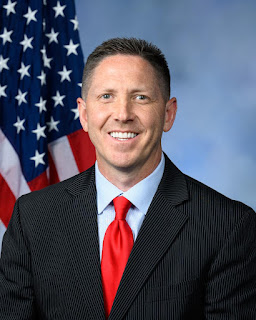I'm a bit behind on posting these, but Oklahoma's 2nd District Congressman Josh Brecheen recently filed two pieces of legislation, the Stop Government Overreach in Ranching Act and the Healthy SNAP Act.
The Stop Government Overreach in Ranching Act would reverse FDA guidance, “GFI 263,” which restricts the use of commonly used livestock antibiotics, such as penicillin. This has put added expense and hardship upon the those involved in agriculture and livestock. The Healthy SNAP Act would exclude soft drinks, candy, ice cream, and prepared desserts from being purchased with SNAP benefits (informally known as food stamps).
Read below for more details on both:
Washington D.C. (June 13th) – Today, Congressman Josh Brecheen introduced the Healthy SNAP Act of 2023. This is companion legislation to S.1485, introduced by Sen. Marco Rubio.
The bill would exclude soft drinks, candy, ice cream, and prepared desserts from being purchased with SNAP benefits. The bill also requires the Secretary to ensure that eligible food promotes the health of SNAP recipients and reflects nutrition science, public health concerns, and cultural eating patterns.
“Why should our taxpayer dollars be allowed to be spent on junk foods that provide no nutritional value and contribute to America’s obesity epidemic? This is a commonsense reform that will protect taxpayer dollars, improve diet quality, and in the long run will reduce medical costs, with the CDC finding that obesity costs $150 billion per year in the U.S. I urge my colleagues to join me in supporting this legislation,” said Congressman Josh Brecheen.
“Taxpayer dollars should not be spent on junk food. The Healthy SNAP Act will ensure that SNAP program funds go toward healthy nutritious food rather than soda, chips, ice cream or cake,” said Senator Marco Rubio (R-FL).
Co-sponsors include Representatives Andy Biggs (R-AZ), Laurel Lee (R-FL), Glenn Grothman (R-WI), and Michael Cloud (R-TX).
Background Information (courtesy of Senator Rubio’s Office):
More than 20 percent of all SNAP spending goes to unhealthy foods and beverages.
According to the USDA, taxpayers are projected to spend $240 billion on junk food, with more than $60 billion going exclusively to soda over the next decade through SNAP.
According to an NIH-published study, U.S. counties with poverty rates of >35% have obesity rates 145% greater than wealthy counties. Further, more than 40% of U.S. adults are obese, and roughly half have diabetes or prediabetes. Obesity—especially in young adults and children—is associated with unemployment, limits on educational attainment and lower levels of income.
According to the Centers for Disease Control and Prevention, the medical care costs of obesity are almost $150 billion per year in the U.S. A Harvard study found that obesity-related medical costs could rise by $48 to $66 billion per year by 2030.
Washington, D.C. (June 12th) – On Monday, Congressman Josh Brecheen and Congressman Eric Burlison (R-MO) introduced the Stop Government Overreach in Ranching Act. This legislation would reverse FDA guidance, “GFI 263,” which restricts the use of commonly used livestock antibiotics, such as penicillin, LA 200/300 (oxytetracycline), sulfa-based antibiotics, gentamicin, and a host of other antibiotics that are often bought at local feed stores. This new FDA guidance will require a veterinarian to first issue livestock owners a prescription prior to use starting June 11, 2023.
Reps. Brecheen and Burlison’s bill would repeal this FDA guidance and prohibit the agency from issuing a substantially similar guidance or rule.
“This FDA guidance by unelected bureaucrats only adds expense and hardship upon those of us involved in production agriculture. If you have a calf that develops pneumonia or scours, you ought to be able to address it in keeping with 80 years of proven livestock antibiotic use, without having to get a permission slip thanks to a suit-laden bureaucrat in a cubicle. What happens if I discover a sick animal and it is not possible to obtain a script from a vet due to the distance, availability of the vet, and the clinics typical closing time? Before this guidance, I could have gone to the local feed store five minutes down the road. This guidance will steal valuable time in treating sick animals and reduce inexpensive options. It will result in vets being forced to charge for their time, overloaded with requests from frustrated neighbors, and more costs for scripts and antibiotics—all the while, knowledgeable ranchers and farmers will keep buying the same antibiotics they always have for decades. The only winner here will be the feel-good bureaucracy appeasing leftist World Health Organization grand ideals,” said Brecheen.
GFI 263 is part of a larger effort by the FDA and the World Health Organization to reduce antimicrobial resistance across the globe. While some countries do not have the same level of regulation on agricultural antibiotic use, many countries, such as China, do not play by the same rules. China, for its part, is the largest consumer of agricultural antibiotics and out-doses the United States eight-to-one. Even scientists who are in favor of heavy restrictions and want to lessen animal protein consumption worldwide admit that “global enactment” of restrictions will “only go so far,” and that “current reforms will have limited success.”
“Similar to radical climate ideology adherence, this administration will place burdens on American ranchers while many other parts of the world do not play by the same rules,” Brecheen concluded.
“Ranchers work hard to take care of their livestock. Yet, Washington bureaucrats continue to add guidances and regulations that make caring for their livestock increasingly more difficult. The Stop Government Overreach in Ranching Act will repeal the FDA’s burdensome guidance and give back to ranchers the ability to make their own decisions about their livestock. It’s time Washington start trusting our ranchers and farmers, and this bill is a strong step in the right direction,” said Burlison.
“Our cattle producers have been shocked by the news that they would be unable to purchase over the counter the same antibiotics they have used safely for decades. The sentiment from our farmers and ranchers regarding the veterinary feed direction has been clear and unanimous—It’s an unnecessary added expense and will be an undue burden on producers. Our livestock producers have years of experience managing these antibiotics; they know what their animals need to thrive. We applaud Rep. Brecheen’s trust in farmers and ranchers and his work to roll back this burden on American agriculture,” said American Farmers & Ranchers/Oklahoma Farmers Union Scott Blubaugh.











0 comments:
Post a Comment
PLEASE INCLUDE YOUR NAME when commenting. Anonymous comments may be rejected if NOT accompanied by a name.
Comments are welcome, but remember - commenting on my blog is a privilege. Do not abuse that privilege, or your comment will be deleted.
Thank you for joining in the discussion at MuskogeePolitico.com! Your opinion is appreciated!